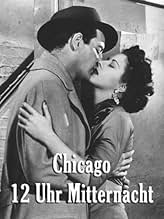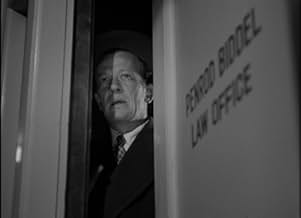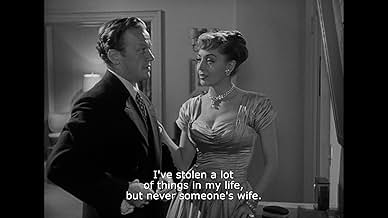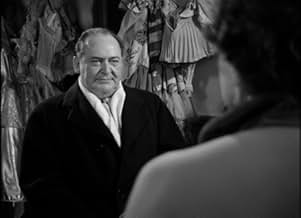IMDb RATING
6.7/10
1.8K
YOUR RATING
Johnny Kelly, who plans on resigning from the police force and leaving his wife the next day, has a very eventful last night on duty.Johnny Kelly, who plans on resigning from the police force and leaving his wife the next day, has a very eventful last night on duty.Johnny Kelly, who plans on resigning from the police force and leaving his wife the next day, has a very eventful last night on duty.
Tom Poston
- Detective
- (as Thomas Poston)
Roy Barcroft
- Mechanical Man Attraction Hawker
- (voice)
- (uncredited)
Helen Gibson
- Woman
- (uncredited)
- Director
- Writer
- All cast & crew
- Production, box office & more at IMDbPro
6.71.7K
1
2
3
4
5
6
7
8
9
10
Featured reviews
It works, but it's very much an oddity.
Chicago cop Johnny Kelly wants to run away, from his job with the police force, and from his perceived mundane marriage. Hoping to flee Chicago with his stripper girlfriend Angel Face, he keeps putting it off with bouts of cold feet. Then one night when Johnny is assigned a new partner, Angel finally grows tired of false hopes and promises, just as Johnny is tempted by the dark side to finally realise both their dreams, but other factors are heading their way.....
Directed by John H. Auer and starring Gig Young as Kelly, City That Never Sleeps was brought to us out of the low budget Republic Pictures studio. Oddly fusing film-noir with fantastical elements makes for a most intriguing watch, yet it's very much a slog to get to a point where you feel your time has been worth it. But crucially it is worth the wait, lots of character strands all thread together to give us an exciting, and well executed climax, tho the fantastical finish point is something of a head scratcher to me personally. It's a weird film in many ways, and one that probably needs repeat viewings to fully grasp {and appreciate} what the hell is going on with all these characters. The weird feel is emphasised by John L. Russell's {Psycho & The Cabinet of Caligari} grimly lighted photography, who utilises the sparseness of the actual Chicago locations to great effect.
Known to be a favourite film of Martin Scorsese, City That Never Sleeps is actually a little better than it's B movie tagging. But it remains a film that one feels should have been much better. It's alright to fuse more than a couple of genre's, but you have to make it work convincingly within the structure of the plot{s}, and realistically they only just manage to pull it off, courtesy of a fine, if weird, ending. 6/10 but it could go either way upon a further viewing.
Directed by John H. Auer and starring Gig Young as Kelly, City That Never Sleeps was brought to us out of the low budget Republic Pictures studio. Oddly fusing film-noir with fantastical elements makes for a most intriguing watch, yet it's very much a slog to get to a point where you feel your time has been worth it. But crucially it is worth the wait, lots of character strands all thread together to give us an exciting, and well executed climax, tho the fantastical finish point is something of a head scratcher to me personally. It's a weird film in many ways, and one that probably needs repeat viewings to fully grasp {and appreciate} what the hell is going on with all these characters. The weird feel is emphasised by John L. Russell's {Psycho & The Cabinet of Caligari} grimly lighted photography, who utilises the sparseness of the actual Chicago locations to great effect.
Known to be a favourite film of Martin Scorsese, City That Never Sleeps is actually a little better than it's B movie tagging. But it remains a film that one feels should have been much better. It's alright to fuse more than a couple of genre's, but you have to make it work convincingly within the structure of the plot{s}, and realistically they only just manage to pull it off, courtesy of a fine, if weird, ending. 6/10 but it could go either way upon a further viewing.
Not Sleepy
I can't wait to see the DVD release of this film with the features and commentary because it is one of those rare Noir films that stay with you. Not so much for the average domestic problems that Gig Young's character displays but more for his relationship with Mala Powers and their great quotable lines:
Sally "Angel Face" Connors, dressed in a stripper's costume to Johnny Kelly- "Come here." Kelly's reply: "I've been there."
And Angel Face's great speech explaining her disillusionment: "I'm sick of this town. I'm with you Johnny. When I first came to this town I was gonna be... oh there were a lotta things I was gonna be- become famous. But Chicago's the big melting pot, and I got melted but good".
And there are also the throw-away lines in the bar: Waitress to Bartender: "Two Old Fashions- no ice, no water, no sugar, no grenadine".
"City That Never Sleeps" has a light step and has so many quirky little characters that you might wonder who the story is about. The film does focus on certain characters to make its point, is sometimes great to look at for its night-lit location photography and has some nice noir humor.
Gig Young has the unflappable charm and bon vivant attitude that almost gets in the way of his disillusioned cop Johnny Kelly. Kelly is the ultimate Everyman who has become a cop because his father wanted him to, and whose wife unwittingly emasculates him because she earns more money that he.
All in all, "City That Never Sleeps" is worth catching for its noir look and some good performances.
Sally "Angel Face" Connors, dressed in a stripper's costume to Johnny Kelly- "Come here." Kelly's reply: "I've been there."
And Angel Face's great speech explaining her disillusionment: "I'm sick of this town. I'm with you Johnny. When I first came to this town I was gonna be... oh there were a lotta things I was gonna be- become famous. But Chicago's the big melting pot, and I got melted but good".
And there are also the throw-away lines in the bar: Waitress to Bartender: "Two Old Fashions- no ice, no water, no sugar, no grenadine".
"City That Never Sleeps" has a light step and has so many quirky little characters that you might wonder who the story is about. The film does focus on certain characters to make its point, is sometimes great to look at for its night-lit location photography and has some nice noir humor.
Gig Young has the unflappable charm and bon vivant attitude that almost gets in the way of his disillusioned cop Johnny Kelly. Kelly is the ultimate Everyman who has become a cop because his father wanted him to, and whose wife unwittingly emasculates him because she earns more money that he.
All in all, "City That Never Sleeps" is worth catching for its noir look and some good performances.
The Heroic Mechanical Man...
...is but one of the many elements in this quirky film that makes it SO enjoyable. The plot is complex, but still masterfully laid out, the dialogue is clean and effective, and the imaginative direction, lighting, cinematography and editing clearly place "City" in the ranks of minor classics.
In fact, you are rarely aware that this was a low-budget Republic Studios pic. There's one scene near the end...the standard "calling all cars" scene in the police station, which could have been shot with a single guy at a microphone with a bare wall behind him; instead, we see a bee-hive of activity, with several radio cops reflected in a magical labyrinth of glass panes, with shadowy figures passing through the hallway in back of them. It's seemingly insignificant details such as this that keep "City" bristling with intense visuals and character interplay from beginning to end (yeah, the scene with William Talman breaking into Edward Arnold's office at night could have been edited down to about half its length, and the continually recurring stock footage of the police car's POV while racing past a bunch of 1940's parked cars is pretty comical).
Having a heavyweight actor like Arnold in a pivotal role lends acting "gravitas"; William Talman, an actor I've never really cared for, is superb---subtle, cunning, and ultimately maniacal. The confusion between John Kelly Sr. and Jr. as the tension builds is but one of the masterful plot devices, and the subplot of the Mechanical Man (Wally Cassell) and his dreams of an idyllic life with his lady love amidst the wonders of nature is positively brilliant, as is his change of heart and willingness to sacrifice himself for a noble cause. Cassell's physical skill is as impressive as the emotional sensitivity he brings to the role* And how about mother-in-law's offstage nagging of Gig Young? I found it subtly creepy, almost like mother's voice in PSYCHO.
On top of it all, we have the Chill Wills character; you must decide for yourself if it helps or harms the film; I took it as just another off-beat element in this imaginative story of a single night in Chicago. Who knows?--maybe the whole thing was a bad dream from which Gig Young wakes up at the end.
Only Mala Powers disappoints in her role; she was rather miscast as the tough, world-weary dame, though her more sensitive scenes are fine.
* NOTE - The December 22nd, 1960 episode of TV's June Allyson Show was entitled "SILENT PANIC", and featured HARPO MARX as a deaf-mute who works at Christmastime as a Mechanical Man in a department store window; he also happens to be the only eyewitness to a murder on the street. Sound familiar? Unfortunately, the hour-long show fails miserably to live up to its fascinating premise. But I wonder how many other films, radio shows, stories, etc have used this novel plot device over the years.
In fact, you are rarely aware that this was a low-budget Republic Studios pic. There's one scene near the end...the standard "calling all cars" scene in the police station, which could have been shot with a single guy at a microphone with a bare wall behind him; instead, we see a bee-hive of activity, with several radio cops reflected in a magical labyrinth of glass panes, with shadowy figures passing through the hallway in back of them. It's seemingly insignificant details such as this that keep "City" bristling with intense visuals and character interplay from beginning to end (yeah, the scene with William Talman breaking into Edward Arnold's office at night could have been edited down to about half its length, and the continually recurring stock footage of the police car's POV while racing past a bunch of 1940's parked cars is pretty comical).
Having a heavyweight actor like Arnold in a pivotal role lends acting "gravitas"; William Talman, an actor I've never really cared for, is superb---subtle, cunning, and ultimately maniacal. The confusion between John Kelly Sr. and Jr. as the tension builds is but one of the masterful plot devices, and the subplot of the Mechanical Man (Wally Cassell) and his dreams of an idyllic life with his lady love amidst the wonders of nature is positively brilliant, as is his change of heart and willingness to sacrifice himself for a noble cause. Cassell's physical skill is as impressive as the emotional sensitivity he brings to the role* And how about mother-in-law's offstage nagging of Gig Young? I found it subtly creepy, almost like mother's voice in PSYCHO.
On top of it all, we have the Chill Wills character; you must decide for yourself if it helps or harms the film; I took it as just another off-beat element in this imaginative story of a single night in Chicago. Who knows?--maybe the whole thing was a bad dream from which Gig Young wakes up at the end.
Only Mala Powers disappoints in her role; she was rather miscast as the tough, world-weary dame, though her more sensitive scenes are fine.
* NOTE - The December 22nd, 1960 episode of TV's June Allyson Show was entitled "SILENT PANIC", and featured HARPO MARX as a deaf-mute who works at Christmastime as a Mechanical Man in a department store window; he also happens to be the only eyewitness to a murder on the street. Sound familiar? Unfortunately, the hour-long show fails miserably to live up to its fascinating premise. But I wonder how many other films, radio shows, stories, etc have used this novel plot device over the years.
Kept Me Awake.
A 1953 Republic gem and a great noir find. This sort of small black and white drama was actually what finished off Republic as TV shows took up this sort of storyline and style, and the studio didn't adapt. Cop Gig Young and burlesque floozie Mala Powers go adulterous and the realism of the noir photography created on actual Chicago streets allow the viewer to be completely absorbed into their cheap backstreet world. This is such an interesting film, and the low budget actually works in its favour......like Monogram's startling DECOY of 1947. Chill Wills appears as a very special and strange character and I won't spoil who he is at all. A very clever and ultimately quite emotional film from a fascinating period in American Cop-dom: 1953...as LA CONFIDENTIAL proved for that city. Find this and relish it, and thank the crummy world of Republic for making it. As a bonus for all us noir-ees, the sensational Marie Windsor is here as well, by the narrowest of welcome margins.
A satisfying, big-city movie sort of a Grand Hotel or Dinner At Eight gone noir
Contrary to the croonings of Liza Minnelli and Frank Sinatra, The City That Never Sleeps is not New York, New York but Chicago, Illinois. At least it is in John H. Auer's 1953 movie of that name, sort of a noir-inflected Grand Hotel or Dinner At Eight, that opens and closes with floodlit vistas of the wedding-cake Wrigley Building. Several characters' lives intersect in an urban crime drama that even offers a touch of the fanciful.
Gig Young, at the center, plays a cop who's dissatisfied with his job and with his marriage (his wife, Paula Raymond, makes more money than he does). Off hours, he hangs around a strip club called The Silver Frolics on Wabash Avenue to see, both on stage and backstage, headliner Mala Powers. That relationship is a rocky as his marriage, and she's as unhappy with her lot as he with his (`Whaddaya want me to do? Crawl into a deep freeze?' she taunts him during yet another breakup). Then Young heads to the precinct for the graveyard shift, riding in a prowl car with a new partner he's never met before (Chill Wills, who also plays the unseen `Voice of the City').
During Young's nocturnal tour he meets up again and again with the various players in the plot. There's rich, crooked lawyer Edward Arnold, who blackmails him into burglarizing some incriminating papers; his two-timing wife, Marie Windsor; former magician turned criminal William Talman; his own brother (Ron Hagerthy) who's now Talman's apprentice; his pop (Otto Hulett), a police veteran; and a `mechanical man' (Gregg Warren) who entertains passersby in the Silver Frolics' window.
Some of the ties among the characters are up front, others furtive, to be doled out as the plots thicken. By the end (Poverty Row having learned the lessons MGM taught a couple of decades earlier in the titles cited above), there's tragedy and heartache, reappraisals and reconciliations. There's even a character who vanishes as mysteriously as he materialized a whiff of the supernatural which curiously fails to leave any influence on the way the stories unfold.
The City That Never Sleeps shows the right breadth for a big, urban story from Arnold's moderne penthouse to Young's middle-class flat to the raffish alleys running off Wabash Avenue. Director of photography John Russell (later to film Psycho) helps Auer out with some crafty touches (a telephone dial glowing from a flashlight shone upon it comes to mind). It's not a haunting movie, but it's a satisfying one a title that did Republic Pictures proud.
Gig Young, at the center, plays a cop who's dissatisfied with his job and with his marriage (his wife, Paula Raymond, makes more money than he does). Off hours, he hangs around a strip club called The Silver Frolics on Wabash Avenue to see, both on stage and backstage, headliner Mala Powers. That relationship is a rocky as his marriage, and she's as unhappy with her lot as he with his (`Whaddaya want me to do? Crawl into a deep freeze?' she taunts him during yet another breakup). Then Young heads to the precinct for the graveyard shift, riding in a prowl car with a new partner he's never met before (Chill Wills, who also plays the unseen `Voice of the City').
During Young's nocturnal tour he meets up again and again with the various players in the plot. There's rich, crooked lawyer Edward Arnold, who blackmails him into burglarizing some incriminating papers; his two-timing wife, Marie Windsor; former magician turned criminal William Talman; his own brother (Ron Hagerthy) who's now Talman's apprentice; his pop (Otto Hulett), a police veteran; and a `mechanical man' (Gregg Warren) who entertains passersby in the Silver Frolics' window.
Some of the ties among the characters are up front, others furtive, to be doled out as the plots thicken. By the end (Poverty Row having learned the lessons MGM taught a couple of decades earlier in the titles cited above), there's tragedy and heartache, reappraisals and reconciliations. There's even a character who vanishes as mysteriously as he materialized a whiff of the supernatural which curiously fails to leave any influence on the way the stories unfold.
The City That Never Sleeps shows the right breadth for a big, urban story from Arnold's moderne penthouse to Young's middle-class flat to the raffish alleys running off Wabash Avenue. Director of photography John Russell (later to film Psycho) helps Auer out with some crafty touches (a telephone dial glowing from a flashlight shone upon it comes to mind). It's not a haunting movie, but it's a satisfying one a title that did Republic Pictures proud.
Did you know
- TriviaAt least twice in the film the word "hood," denoting a small-time criminal, is used in which it is pronounced to rhyme with "food." The word in that usage and pronunciation originated in Chicago, where the film is set, although nationwide it means the same but is mainly pronounced to rhyme with "good."
- GoofsStuntman Dale Van Sickel is clearly seen instead of actor William Talman in the shot where Hayes Stewart jumps over the skylight during the rooftop chase.
- Quotes
Sally 'Angel Face' Connors: When I first came to this town I was gonna be - oh, there were a lot of things I was gonna do. Become famous. But Chicago's the big melting pot, and I got melted, but good.
- Crazy creditsThis motion picture is respectfully dedicated to the police and police departments of America - a brave army of men and women who form our first line of defense in preserving our sacred principles of personal liberty and justice. We gratefully acknowledge the valuable assistance given by the City of Chicago and its police and Police Department, whose cooperation made this picture possible.
- ConnectionsFeatured in Why I Love Film Noir (2025)
Details
- Release date
- Country of origin
- Language
- Also known as
- Chicago - 12 Uhr Mitternacht
- Filming locations
- Production company
- See more company credits at IMDbPro
- Runtime
- 1h 30m(90 min)
- Color
- Aspect ratio
- 1.37 : 1
Contribute to this page
Suggest an edit or add missing content




































